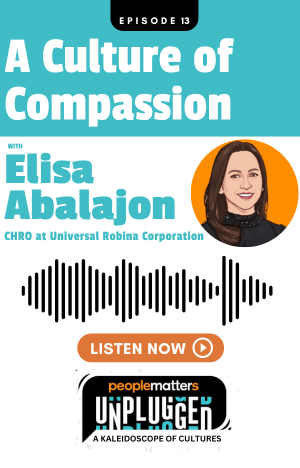Embracing possibilities through innovation and social empowerment

Ankit Agarwal, founder of Phool.co, a startup that recycles floral waste and purifies water sources, shared his journey in a keynote session at People Matters TechHR India 2023.
A former automation engineer, Ankit faced skepticism for his work in temple restoration and the sustainability startup he built. He remarked “Fast forward to 2017, we had formed the world's first charcoal-free incense sticks made from temple flowers. Today, we are the fastest online selling incense and our repeat rates are more than 60%. People love us. We are the only charcoal-free, fair trade certified incense in the country."
Making environment-friendly incense from floral waste
Sharing insights on daily operations at phool.co, Ankit said, “We receive 22 metric tons of flowers from significant locations including Ayodhya, Varanasi, Bodhya, Badrinath, Pradhanath, and Kanpur. These flowers undergo meticulous sorting, segregation of materials such as paper, pattar, or plastic, and species classification. Our unique bio-film is then applied to remove pesticides, and the flowers are subsequently cleaned, sun-dried, and transformed into the final products. In the past five years, we have moved ahead and established the world's first dedicated R&D towards floral waste.”
Combating environmental challenges
Not only has Phool.co resolved the bio-waste crisis, but it is also pioneering alternatives to environmental hazards like Styrofoam. Ankit shared, “Currently, mankind lacks effective Styrofoam recycling solutions. Typically, it's either incinerated or buried for over 800 years, with a carcinogenic production process. Additionally, Styrofoam is single-use; you dispose of packaging after one use, like a refrigerator box. At Food, I had a radical idea – why not create Styrofoam from flowers? Despite initial scepticism, we've achieved a breakthrough. We've developed Florafoam, a material identical to Styrofoam. A primary packaging for a fan motor, composed of Florafoam, demonstrates our innovation. Remarkably, Florafoam is not just biodegradable, but also home compostable, breaking down within 45 days when exposed to soil bacteria.”
FLEATHER: Innovative alternative to leather
Our pursuit of sustainable alternatives extended to leather production, Phool.co found an alternative FLEATHER, with the characteristics of leather and absolutely plastic-free. Ankit added, “When we investigate the leather industry, it's inextricably linked with livestock. The intertwined impact of these sectors consumes roughly 30% of the planet's green land mass and 27% of its freshwater supply. Regrettably, this industry also ranks among the highest sources of median emissions on Earth. On a positive note, we've harnessed the potential of temple flowers and transformed them into a substance mirroring leather's behaviour - Fleather. This remarkable material is obtainable, endlessly adaptable, and entirely plastic-free. You can tweak it to suit specific requirements: tensile strength, elasticity, insulation, even postage and buffering. Moreover, our technology is exceptionally sustainable. To illustrate, a cow takes around 3 years to reach full size before being slaughtered for leather. In our laboratory, we accomplished this in just 3 weeks. From initially taking 3 months, we now produce leather in just 2 days, generating 20-220 square feet daily. This leather serves prestigious luxury brands worldwide. As I stand before you today, the commitment I made six years ago remains unwavering: not a single flower from our efforts will end up in the water supply.”
Creating social impact and empowerment
The journey of Phool.co is around impacting lives positively driven by compassion, and reflecting a commitment to empower marginalized communities, particularly women. Ankit shared, “In India, there are approximately 1.6 million sanitation workers, often referred to as "manual scavengers." These people courageously navigate the depths of sewage systems to remove human waste, an uncomfortable reality seldom acknowledged, even taboo to discuss openly. Imagine broaching this topic at a dinner table. At Phool.co, we have embraced a unique mission. Today, we've provided employment to over 650 women who were once part of this sanitation workforce. Our efforts not only grant them disease-free financial sustenance but also a life of dignity and respect.”
Sharing an incident from Kerala on the same, he added, “From the early days of Phool.co’s operations, when our team consisted of only about 50 individuals, Rehma, one of our team members, distributed sweets in the factory. Curious, I questioned the expenditure. Her response was profound. She shared that even if she could offer just half a ladoo (a traditional Indian sweet), she wanted to ensure that everyone received one. Intrigued, I inquired further, and Rehma explained that the team had purchased a refrigerator, financed through EMI. At 90 years old now, Rehma recounted a personal story - her yearning for cold water in a place where she used to clean toilets. The owners, however, wanted her to test utensils, so they could provide her with water. In that moment, she harboured a wish to own her refrigerator one day.
After working with Phool.co for approximately six months, Rehma saved enough money to purchase her own refrigerator. She shared how the children from more privileged neighbours now consumed water and food from her refrigerator. This newfound equality between her children and those from the neighbourhood fills her with a peaceful sense of accomplishment. This journey isn't solely about clearing waste from the land; it's about rectifying the injustices of the past and healing the wounds left by previous generations.”










